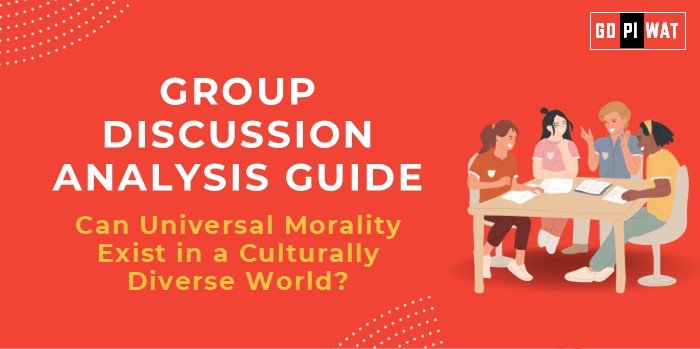📋 GD Analysis Guide: Can Universal Morality Exist in a Culturally Diverse World?
🌐 Introduction to the Topic
Opening Context: In an increasingly interconnected world, cultural diversity is both a strength and a challenge. The question of whether a universal morality can exist amid such diversity is crucial for global harmony, policymaking, and conflict resolution.
Topic Background: The idea of universal morality has roots in philosophy, religion, and human rights. Thinkers like Immanuel Kant proposed moral universals based on reason, while cultural relativists argue that morality is culturally specific and subjective. The debate remains relevant in discussions about global justice, human rights, and international cooperation.
📊 Quick Facts and Key Statistics
- 📜 Human Rights Universal Declaration: Adopted by 193 countries; demonstrates attempts at global moral frameworks.
- 🌏 Cultural Diversity Index (UNESCO): Over 7,000 languages spoken worldwide highlight moral diversity.
- 🌍 Globalization Impact: 70% of nations report increased cultural exchanges; underscores the need for shared ethics.
- 🕊️ Religious Adherence: Over 80% of the global population identifies with a religion, shaping moral norms.
🎯 Stakeholders and Their Roles
- 🧠 Philosophers and Ethicists: Develop frameworks for universal morality.
- ✝️ Religious Leaders: Advocate morality based on faith while promoting intercultural dialogue.
- 🏛️ Governments: Create policies that balance cultural relativism and universal ethics.
- 🌐 International Organizations (e.g., UN): Promote shared moral values like equality and justice.
🏆 Achievements and Challenges
✨ Achievements:
- 🌍 Human Rights Framework: The UN Declaration provides a shared ethical foundation.
- ⚖️ International Courts: Promote accountability across borders, reflecting universal justice principles.
- 🤝 Cultural Dialogues: Platforms like UNESCO foster understanding and moral consensus.
⚠️ Challenges:
- 📏 Moral Relativism: Contradicts universal standards, causing ethical conflicts.
- 🌀 Ethnocentrism: Imposing one culture’s morality risks alienation or resistance.
- 📉 Global Disparities: Inequality complicates agreement on universal ethics.
🌍 Global Comparisons
- 🇸🇪 Success: Scandinavian countries often align moral laws with universal ethics.
- 🌏 Challenges: Nations with strong religious or ideological divides struggle to adopt universal norms.
🗣️ Structured Arguments for Discussion
✔️ Supporting Stance:
“A universal moral code, such as human rights, enables global cooperation and reduces conflicts.”
❌ Opposing Stance:
“Morality is inherently subjective, shaped by culture, religion, and history, making universality impractical.”
⚖️ Balanced Perspective:
“While universal morality offers a framework, cultural nuances must be integrated to ensure inclusivity.”
🧠 Effective Discussion Approaches
💡 Opening Approaches:
- 📜 Historical Context: “From Kant’s categorical imperative to the UN’s declaration, humanity has sought moral universals.”
- 📊 Statistical Highlight: “With over 7,000 languages, the world’s diversity necessitates moral frameworks that transcend culture.”
🤔 Counter-Argument Handling:
- ✔️ Example: Acknowledge cultural relativism and propose hybrid solutions like shared moral values supplemented by cultural specifics.
🔍 Strategic Analysis of Strengths and Weaknesses
- ✔️ Strengths: Shared ethical frameworks like human rights.
- ❌ Weaknesses: Persistent cultural disagreements.
- 🌟 Opportunities: Platforms for intercultural dialogue.
- ⚠️ Threats: Rising nationalism and ideological polarization.
📚 Connecting with B-School Applications
- 🌐 Real-World Applications: Developing frameworks for ethical globalization in business, addressing cultural ethics in multinational teams.
- ❓ Sample Interview Questions:
- “How can businesses balance cultural values and universal ethics?”
- “Can global capitalism adopt a universal moral framework?”


